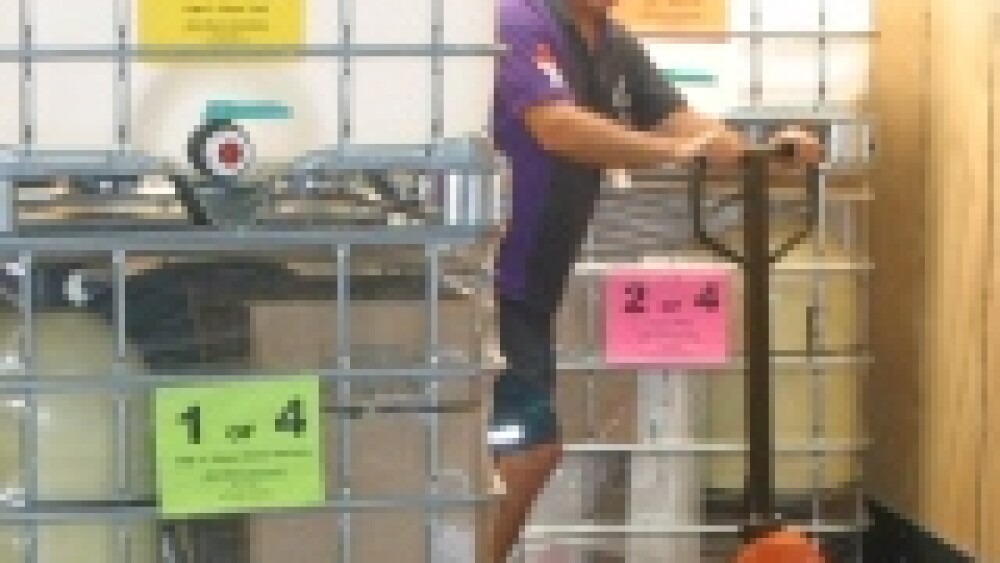Nov. 18, 2010 (Updated) -- FedEx Corp. continues to respond rapidly to the recent cholera outbreak in Haiti, assisting non-profit agencies with 101 tons of donated disaster relief shipping to Port-Au-Prince. A key to quick response is having long-term relationships with relief organizations, and leveraging our transportation and logistics expertise to provide speedy and efficient relief.
A total of forty water purification systems were airlifted from Miami to Haiti for Water Missions International (WMI), in addition to FedEx providing in-kind transportation for the needed components within the U.S. Each of these portable water treatment systems can provide clean water for 5,000 people each day, potentially saving some 200,000 Haitians from water-borne illnesses.
FedEx places a premium on working with organizations that have on-the-ground capacity to manage their shipments. WMI staff are in Haiti to install the systems and have them running in two hours or less. One WMI treatment system can provide safe water to a community not only during this crisis, but for 20 years or more at a cost of less than one penny per day, per person. Since the January earthquake, WMI has installed 115 water treatment systems in Haiti, serving 200,000 earthquake victims. FedEx provided a complimentary charter flight to WMI in February following the earthquake and continues to provide in-kind shipping support in the U.S.
FedEx delivered of 20 skids (11,181 pounds) of cholera medical aid for Heart to Heart International to UNICEF in Port-Au-Prince. Two ATV vehicles were moved by ocean freight to support the Heart to Heart medical clinics within Haiti this month as well. FedEx has worked with Heart to Heart International for fifteen years.
Pre-existing relationships help not only in ensuring that relief will come quickly once supplies are on the ground; they also help expedite getting the goods in the air as organizations know the right people to call and understand each other’s needs and capabilities. Advised that the most urgent need at this time is cots, to be used as hospital beds for the sick, the American Red Cross called their FedEx contact for help. FedEx responded by donating transportation for a shipment of 5,000 cots weighing 40 tons. A second shipment of ten pallets of oral rehydration salts arrives in Port-Au-Prince on November 19, helping to hydrate and replace electrolytes for cholera victims. As a member of the Annual Disaster Giving Program, FedEx provides financial and shipping assistance to enable the Red Cross to respond immediately to the needs of individuals and families impacted by disaster.
FedEx Custom Critical donated shipping for twenty two tons of bar soap for Clean the World in Orlando, some which will travel to Port-Au-Prince via Royal Caribbean, and some by shipping donation from FedEx Express.
Earlier this year FedEx provided more than $1.8M in-kind and cash support for the earthquake relief efforts in Haiti, including in-kind charter flights to support global relief efforts from agencies including Red Cross, World Vision, Heart to Heart International, Direct Relief International, The Salvation Army and Water Missions International. Within one day of the earthquake FedEx had committed $425,000 in cash to support Haiti relief efforts. Within seven days FedEx transported more than 520,000 pounds of relief supplies and within the first month FedEx transported more than 1 million pounds or aid shipments.
FedEx logistics expertise and global reach makes us well positioned during natural disasters and emergencies to quickly get critical supplies to those in need. In times of disaster, access to lifesaving supplies and medicines is critical. FedEx and its workforce have a long tradition of rapidly responding to emergencies and natural disasters, donating facilities, expertise and transportation for aid shipments. Each year, FedEx sets aside space for more than 4,000,000 pounds of charitable shipping.
We urge those who would like to help with relief efforts to contact disaster relief organizations directly. These organizations encourage monetary support rather than collections of new and used items due to logistical challenges at the disaster sites.
